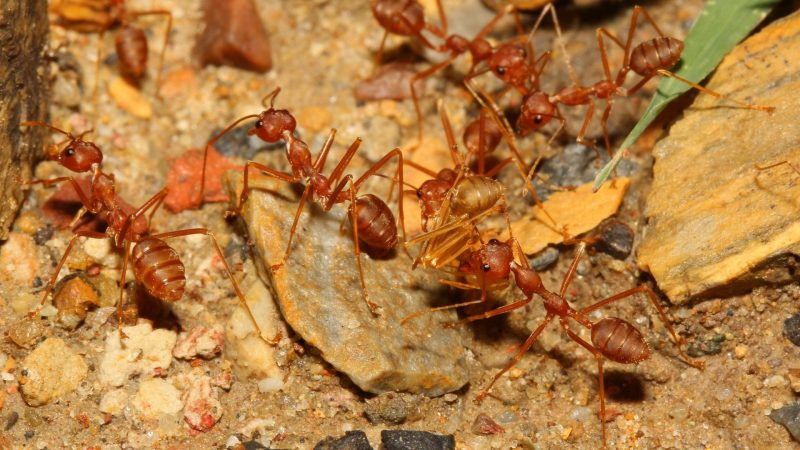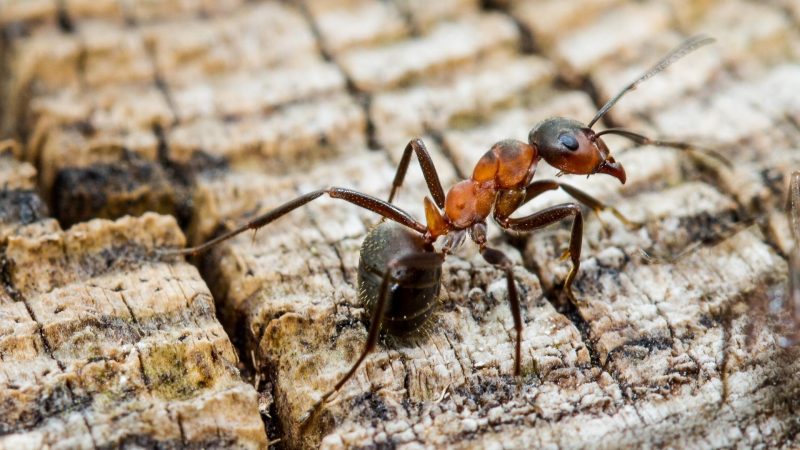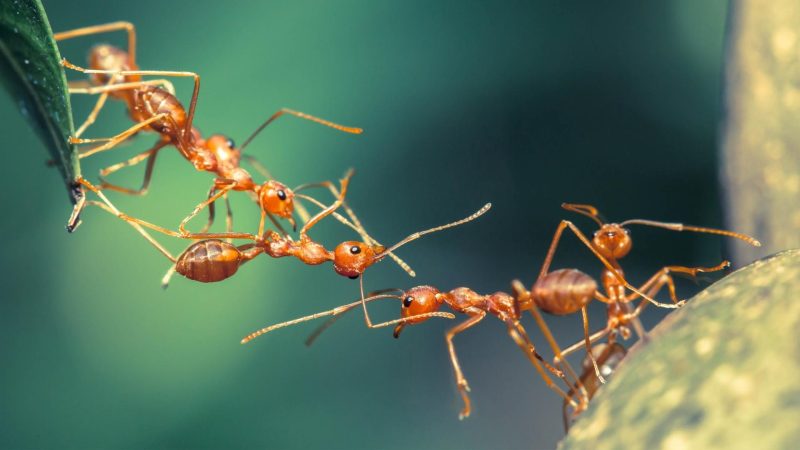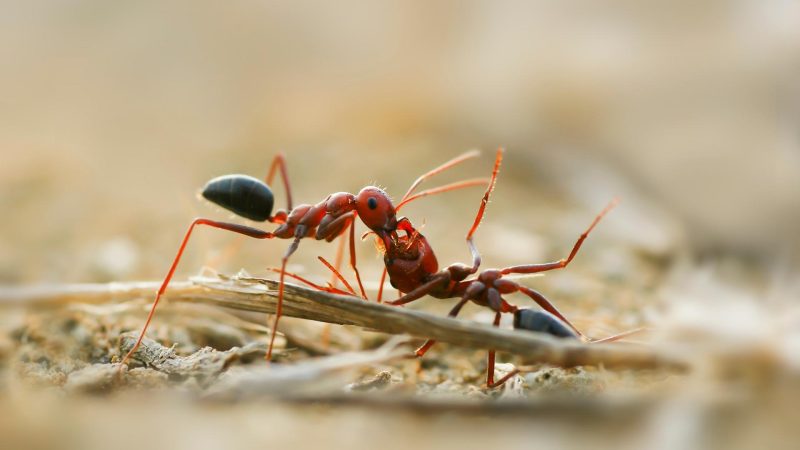Ants are classified as social insects because they live in structured colonies with complex societies. If you’ve ever seen ants, you’ve probably observed a colony around dead ants. If so, you’re probably wondering why dead ants seem to attract more ants.
Do dead ants attract more ants? Dead ants do attract more ants, but for the purpose of burying them. A chemical substance called oleic acid is released by dead ants. This chemical can infect and cause illness to an ant colony. As a result, colonies of ants will approach to recover dead ants for their safety.
Ants communicate by their sense of smell. They release a scent that produces an odor to convey a message to other ants. In this article, we’ll discuss all you need to know about ants.
Table of Contents
Do Squashing Ants Attract More?

Squashing ants results in their death, which attracts more ants. When ants die, they also produce pheromones that notify other ants of potential threats. When one ant dies, other ants in the area will respond to see if there is a threat.
Do Ants Come Back for the Dead?
Ants return to find dead ants. If ants discover that another ant has died, they will remove the bodies to a wasteland known as a midden. The midden is a pile that serves as both a trash and a graveyard. Ants remove a dead ant’s corpse to save their queen from infection.
Do Ants Bury Their Dead?
When an ant died, it released oleic acid. This substance has the potential to infect a colony and cause illness. Thus, ants bury their dead to keep the remaining of the colony and queen safe from infection. They bury the remains in a spot called the midden. When removing the corpse of a dead ant, the ant workers function similarly to undertakers.
Do Ants Feel Pain?

Ants have low cognitive abilities due to their small nervous system and the basic arrangement of neurons throughout the body. As a result, they are unlikely to experience complex emotions.
The higher an animal’s cognitive capacity, the more likely it is to have an emotional reaction. To experience pain, an organism must have a well-developed nervous system, which most insects, including ants, do not possess.
How Smart Are Ants?

Ants are smart compared with other insects because they can communicate with other ants, hunt for food, and navigate over long distances using complex navigation.
Ants are intelligent for the following reasons:
1. Ants teach their knowledge to other ants.
To inform other ants, ants will produce pheromones, which are biological molecules that cause others in the species to react. They just simply leave trails of pheromones for other ants to follow.
2. Ants run their operations like a corporation.
Ants have a hierarchical social organization and collaborate as a team. In a colony, each ant has a different function. Their roles are assigned to them, such as queen, soldier, or laborer.
3. Choosing the most efficient route between food and nest.
When an ant discovers food, it will bring a tiny portion back to the nest and leave evidence of pheromones to guide it back to the food. This search produces an increasing number of pheromones, forming a precise path for each ant to follow.
4. Creating rafts to survive floods.
The ants’ bodies are covered with fine hair that traps enough air to keep them from surviving the flood. They float together until they reach dry ground, placing the queen and larva in the middle of the raft, where they are safest.
How Smart Is a Queen Ant?
Several characteristics distinguish queen ants from the rest of the ant colony. For one reason, queen ants have a very long lifespan. Ant queen can live for about 30 years. The queen ant’s main purpose is to reproduce and is capable of laying thousands of eggs.
Why Do I Have Dead Ants All Over My House?

The presence of colonies of dead ants throughout your property indicates the presence of ant infestation. It’s also possible that the dead ants you discover on your property are the victims of other insects like spiders with a nest in your property.
How to Get Rid of Ants Without Attracting More?
Using these natural methods, you may get rid of ants without attracting more:
1. Diatomaceous Earth – It is made up of the fossilized residues of diatoms, which are freshwater creatures. It kills ants by absorbing the oils in their bodies, causing them to dry out.
2. Liquid detergent – Ants may be deterred from entering your house by combining liquid detergent or dish soap and water. This can eliminate the scent of pheromones they leave behind while walking.
3. Peppermint – An effective natural insect repellent for ants. Combine 10 to 20 drops of peppermint oil with 2 cups of water. Spray the solution around your house’s baseboards and windows.
4. Coffee grounds – Ants are particularly sensitive to smells. Thus, the aroma and presence of coffee may easily confuse them. Sprinkle coffee grounds around pet food bowls and other locations where ants are visible.
5. Boric acid – It is a toxin that has been shown to kill both worker and queen ants. This can degrade the exterior shells and guts of the creatures. Combine 1/2 tsp boric acid, eight tablespoons sugar, and 1 cup warm water to make a solution. Stir until all of the sugar and boric acid has dissolved. Soak cotton balls and put them in places of your house where you’ve noticed ants.
6. Take away their food supply – The easiest technique to get rid of ants is to prevent the issue before it begins. This may be accomplished by ensuring that no food sources are accessible for them. Thus, you should firmly seal food in containers or plastic bags. Remember that sweet and starchy foods like sugar, syrup, and cornmeal attract ants.
What Do Ants Hate Most?
Ants and other insects, such as spiders, hate these following scents and avoid them. Wiping down places with these scents eliminates ant pheromone trails.
There are several scents that ants despise.
- Lavender – The chemical found in lavender called linalool has been proven to efficiently repel mosquitoes, ticks, ants, and various other insects.
- Cinnamon – It is another aromatic spice that can deter ants away. The cinnamon essential oil has been discovered to have both repellent and insecticidal properties against ants. Thus it may be utilized to keep your house ant-free.
- Tea tree oil – Like other essential oils, is an excellent natural ant repellant. To use tea tree oil to repel ants, combine a few drops in a spray bottle and use it in the area where the ants are present.
- Cayenne pepper – Ants despise cayenne pepper and black pepper. You can also prepare a mix of pepper and water solution. Then, spray it around the entry spots.
- Vinegar – Ants despise the smell of vinegar, which serves as a natural cleaning solution. It can remove the scent trails that ants use to communicate and navigate.
- Lemongrass essential oil – It causes ants’ smell sensors to become confused, making it more difficult for them to find food.
- Citrus peels – It has been proven to have antifungal properties, limiting the development of one of the ants’ primary food sources.
Summary
In general, ants communicate by their sense of smell. They release a substance called oleic acid. This substance has the capability of infecting a colony and causing illness. That’s why, when live ants smell it, they swarm to it, and they will then remove the dead ants and bury them.
Ants may be deterred from entering your house by combining liquid detergent or dish soap and water, peppermint, boric acid, coffee grounds, and diatomaceous earth. Ants that despise scents include tea tree oil, citrus peels, lemongrass essential oil, pepper, and vinegar.